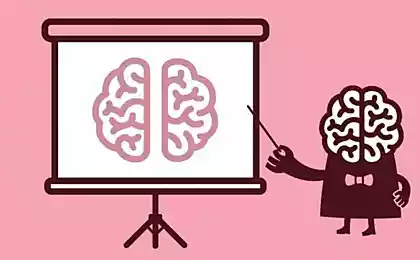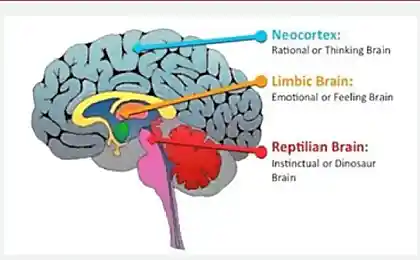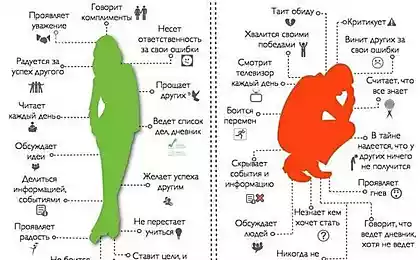414
20 "errors", which makes the human brain
Even the most rational person makes a decision, it is often not fully aware why he made this or that choice. So what really moves us and makes you do different things? The website shares with the reader the most frequent "mistakes" that occur in your brain.

The effect of binding Usually when forecasting any of the figures people tend to focus on the numbers obtained previously. For example, when discussing salary at interview will have the advantage of the person who first said desired numerals, all further discussion will be based on them.
The effect of expectations of the observer If you are interested, your expectations can affect further development. In that case, if you want to get a certain result in the study, then, without realizing it, you will receive customized information to wishful thinking.
Confirmation bias is When a person receives information, he tries to find in it the information that will confirm his personal beliefs and views. That is why sometimes differing eyewitness accounts of some incidents.
Affective heuristic This phenomenon is a kind of filter of feelings and emotions, through the prism of which man is conscious of the surrounding reality. For example, if you are hungry and before your eyes are flashed the words "port", "cake" and "court", then you'll only remember "the cake", because at the moment, it will be important for you.
The herd instinct Many people tend to base their judgments on the opinion of most people. Every man at least once in your life succumb to the herd instinct, even if his personal opinion differed from the rest.
Distortion in the perception of own choice People can be so confident in his choice that may not notice it the irrationality and weaknesses. For example, if your pet dog bites another person, you will think to blame the person pokrasnevshie dog, because it can be aggressive on other dogs, not yours.
Dead zone of cognitive distortion This phenomenon can be expressed in one sentence — "in the eye of another speck see, but in its logs do not notice". People often don't notice our own stereotypes and criticise others for their prejudices.
Conservatism In varying degrees of conservatism exposed to everyone. Many continue to believe in something, even if you receive direct scientific evidence that this is a mistake. An example is the fact that for many years people continued to believe that the Earth was flat, even after a direct refutation and evidence.
The illusion of clustering, some people Have an unconscious desire to see the chains of some random events and regularities that play into the hands of the casino owners. So, many players believe that if they last dropped five in a row "red", and now you need to put on it.
Conformance This phenomenon is reflected in the fact that people tend to behave "like everyone else", sometimes changing their own opinion. Psychologist Solomon Ashe conducted the study, in which volunteers assessed the amount of rectangles, but their group was attended by the people who give deliberately wrong answers. It turned out that 75% of the subjects changed their answers after learned responses "decoy" parties.
Preference zero risk avoidance to one of risk, exposing themselves to another serious hazard — one of the most common mistakes. If people can not fully control the situation, he is inclined to obtain at least insignificant result achieved without any risk.
The tragedy of the Commons is Especially bright this error is manifested in the old days, when a man, finding a good field, began to use it to its full, thereby depleting the land and care for the future. If a group of people have access to a number of resources, some will seek to use them in greater numbers, ignoring the common good and exposing only their interests.
Preference holistic objects are Almost always people trying to complete any work begun, even if it has no big benefits. This error causes that the people coming to the restaurant and ordered a large portion, will feel obliged to eat it completely.
Stereotyping People tend to give specific individuals or groups of people particular properties that are not condition-specific information and drawing conclusions based only on personal prejudices.
The preservation of the status quo, This phenomenon combines the conservatism and "economies of contribution", so people may be afraid to change the position of some things in his life, seeking to avoid losses, even at the cost of missed opportunities.
Systematic error survival Error decision based on existing examples of successful solutions of the problem and the lack of a negative experience, is quite common. So people think that starting their own business there is nothing difficult, there are so many successful businessmen. But in fact these people do not consider that it is quite large and the percentage of business failed.
The illusion of their own superiority People are often happy to talk about their successes, preferring to keep silent about the sufferings of the failures. Because of this, man develops a misconception about their abilities.
Selective perception Alphonse Bertillon, a famous lawyer of France said that "people tend to see only what he sees, but sees only what is present in his subconscious."
The illusion of "kettle" and "special" People who often shift the responsibility on others, susceptible to the phenomenon of overconfidence in the experts. When making important decisions, they run for professional advice, and when everything goes according to plan, I think that they are not to blame, but special, who gave the wrong advice.
The neglect scale In the experiment, three groups of people have offered to donate money to save the birds, the habitat which is under threat due to the oil spill. The first group was offered to save two thousand birds, and each donated 80 dollars, second group — 20 thousand birds, fees accounted for 78 dollars each and each member of the third group paid $ 88 for saving two hundred thousand birds. It turns out that the amount of money that people are willing to pay to solve, for the most part does not depend on its scale.
via factroom.ru

The effect of binding Usually when forecasting any of the figures people tend to focus on the numbers obtained previously. For example, when discussing salary at interview will have the advantage of the person who first said desired numerals, all further discussion will be based on them.
The effect of expectations of the observer If you are interested, your expectations can affect further development. In that case, if you want to get a certain result in the study, then, without realizing it, you will receive customized information to wishful thinking.
Confirmation bias is When a person receives information, he tries to find in it the information that will confirm his personal beliefs and views. That is why sometimes differing eyewitness accounts of some incidents.
Affective heuristic This phenomenon is a kind of filter of feelings and emotions, through the prism of which man is conscious of the surrounding reality. For example, if you are hungry and before your eyes are flashed the words "port", "cake" and "court", then you'll only remember "the cake", because at the moment, it will be important for you.
The herd instinct Many people tend to base their judgments on the opinion of most people. Every man at least once in your life succumb to the herd instinct, even if his personal opinion differed from the rest.
Distortion in the perception of own choice People can be so confident in his choice that may not notice it the irrationality and weaknesses. For example, if your pet dog bites another person, you will think to blame the person pokrasnevshie dog, because it can be aggressive on other dogs, not yours.
Dead zone of cognitive distortion This phenomenon can be expressed in one sentence — "in the eye of another speck see, but in its logs do not notice". People often don't notice our own stereotypes and criticise others for their prejudices.
Conservatism In varying degrees of conservatism exposed to everyone. Many continue to believe in something, even if you receive direct scientific evidence that this is a mistake. An example is the fact that for many years people continued to believe that the Earth was flat, even after a direct refutation and evidence.
The illusion of clustering, some people Have an unconscious desire to see the chains of some random events and regularities that play into the hands of the casino owners. So, many players believe that if they last dropped five in a row "red", and now you need to put on it.
Conformance This phenomenon is reflected in the fact that people tend to behave "like everyone else", sometimes changing their own opinion. Psychologist Solomon Ashe conducted the study, in which volunteers assessed the amount of rectangles, but their group was attended by the people who give deliberately wrong answers. It turned out that 75% of the subjects changed their answers after learned responses "decoy" parties.
Preference zero risk avoidance to one of risk, exposing themselves to another serious hazard — one of the most common mistakes. If people can not fully control the situation, he is inclined to obtain at least insignificant result achieved without any risk.
The tragedy of the Commons is Especially bright this error is manifested in the old days, when a man, finding a good field, began to use it to its full, thereby depleting the land and care for the future. If a group of people have access to a number of resources, some will seek to use them in greater numbers, ignoring the common good and exposing only their interests.
Preference holistic objects are Almost always people trying to complete any work begun, even if it has no big benefits. This error causes that the people coming to the restaurant and ordered a large portion, will feel obliged to eat it completely.
Stereotyping People tend to give specific individuals or groups of people particular properties that are not condition-specific information and drawing conclusions based only on personal prejudices.
The preservation of the status quo, This phenomenon combines the conservatism and "economies of contribution", so people may be afraid to change the position of some things in his life, seeking to avoid losses, even at the cost of missed opportunities.
Systematic error survival Error decision based on existing examples of successful solutions of the problem and the lack of a negative experience, is quite common. So people think that starting their own business there is nothing difficult, there are so many successful businessmen. But in fact these people do not consider that it is quite large and the percentage of business failed.
The illusion of their own superiority People are often happy to talk about their successes, preferring to keep silent about the sufferings of the failures. Because of this, man develops a misconception about their abilities.
Selective perception Alphonse Bertillon, a famous lawyer of France said that "people tend to see only what he sees, but sees only what is present in his subconscious."
The illusion of "kettle" and "special" People who often shift the responsibility on others, susceptible to the phenomenon of overconfidence in the experts. When making important decisions, they run for professional advice, and when everything goes according to plan, I think that they are not to blame, but special, who gave the wrong advice.
The neglect scale In the experiment, three groups of people have offered to donate money to save the birds, the habitat which is under threat due to the oil spill. The first group was offered to save two thousand birds, and each donated 80 dollars, second group — 20 thousand birds, fees accounted for 78 dollars each and each member of the third group paid $ 88 for saving two hundred thousand birds. It turns out that the amount of money that people are willing to pay to solve, for the most part does not depend on its scale.
via factroom.ru
Three Buddhist "noble truths" leading to enlightenment
12 facts about Imperial Russia, which you did not know
























